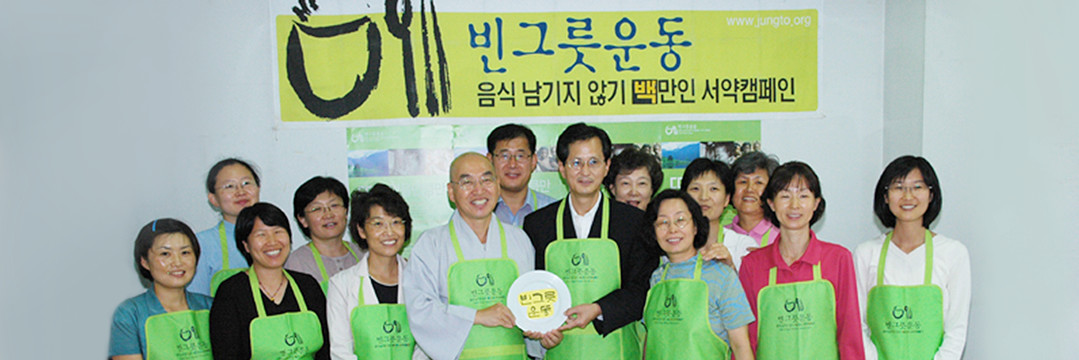Ecobuddha takes the Front Line in the Environmental Movement with the Empty Bowl Campaign
About 50 members of Jungto Society constitute a community and reside at the Jungto Hall in Seocho-dong, Seoul. Hundreds of other Jungto Society members visit the place for various activities. However, hardly any garbage comes out of the building. This is very strange since a place where hundreds of people come and go everyday usually yields several bags of garbage. How can it be possible? In the dining area of the Jungto Hall, all the people who have meals there get only the amount of food they can eat and empty their plates. After that, they clean their plates with drinking water and a piece of clean kimchi, and then, they drink the water and eat the piece of kimchi. As a result, there is less food waste, and the dishes can be washed in an environmentally friendly manner. In the restroom, the members of Jungto Society wash themselves with water instead of toilet paper just like the people in India, and wipe the remaining water with a piece of cloth they carry in a waterproof bag.

Such environmentally friendly actions are not limited to the Jungto Hall of Seocho-dong. All the members of Jungto Society of about 170 dharma centers in South Korea, about 40 dharma centers overseas, and about 50 dharma group meetings have vowed to change the world into a clean, clear, and bright land and carry out these environmental actions both at home and at the dharma centers.
They turn any little food waste that is produced in the house into compost by feeding it to earthworms that they keep in flowerpots in and around the house. Also, instead of using dish soap, they wash the dishes with rice starch water or the cleaning liquid made out of EM enzyme. They have taken the vow to make both themselves and other people become free of suffering and lead a happy life. They wake up at 5 am every morning, pray for one hour, and donate one dollar every day. They begin each day keeping in mind the 120 million people in the world who are suffering from famine, disease, and illiteracy. The empty plate campaign of Ecobuddha, which began in 2004 with the aim of eliminating food waste, garnered a huge response and had over 1.5 million participants within two years, gaining the status of an exemplary environment movement.

